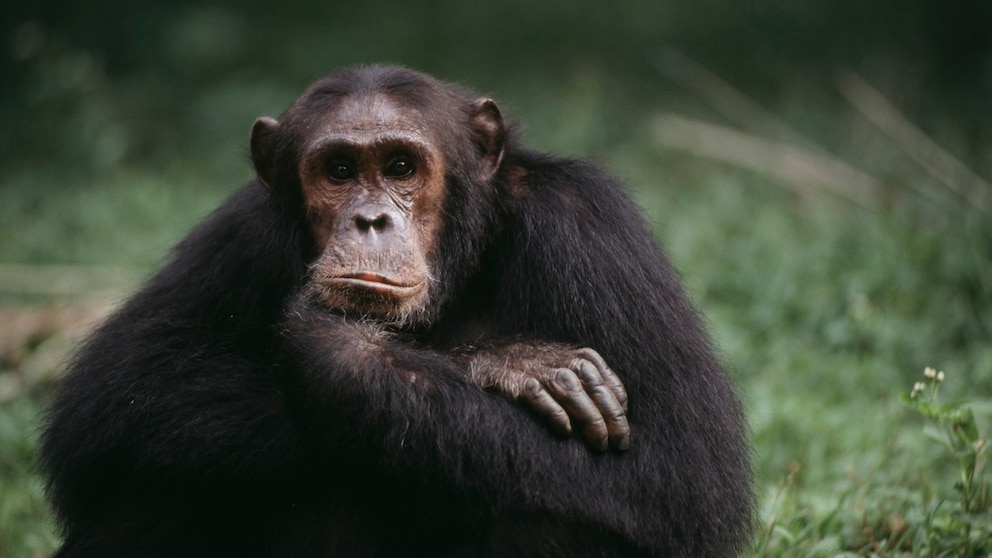February 12, 2025, 10:15 am | Read time: 4 minutes
Culture and language do not only exist in humans but also in the animal kingdom. This has been particularly well studied in primates, who use gestures to communicate their needs. However, a certain movement that heralds a partnership approach in chimpanzees seems to be lost. According to a study, the reason for this is humans. Cultural and linguistic scientist Louisa Stoeffler analyzes the results for PETBOOK.
Sign language is common in many cultures around the world. It doesn’t even have to be an entire sign language, but sometimes just signs that are understood across cultures. Just think of a thumb or middle finger raised upwards – these gestures are used for the same communication purposes in many cultures. There are also suggestive gestures that are used to initiate sexual intercourse. Chimpanzees also have a certain repertoire of gestures that they use to ask conspecifics for sex. However, they seem to be losing some of them, which could have serious consequences for the endangered animals.
Chimpanzees Also Pass on Traditions to Subsequent Generations
It is well known that chimpanzees have a sophisticated sign language. Most recently, a study was published in July 2024 on the rapid conversations that the animals have with over 8500 different hand movements. Animals learn many of their behaviors from conspecifics – be it through imitation, joint play, or targeted social interaction.
Particularly in highly intelligent species such as chimpanzees, there is also evidence of group-specific traditions that can last for generations. Such cultural patterns can be seen in the choice of tools, the search for food, or even in forms of communication such as gestures. However, it appears that parts of this repertoire are also lost over time.
This is because cultural knowledge about what certain gestures are supposed to express is also passed on among primate groups. A study on wild chimpanzees in Côte d’Ivoire shows what happens when these traditions disappear. For their study, researchers followed four neighboring chimpanzee communities in the Taï National Park (Ivory Coast) over a period of up to eleven years.
“Pick-up Gestures” of Chimpanzees Vary from Group to Group
They discovered that male chimpanzees use specific, group-dependent sound gestures to initiate mating. These included, for example
- Branch shake: shaking of branches
- Knuckle-knock: knocking with the knuckles
- Heel kick: kicking with the heel
- Leaf-Clip: tearing up leaves
What was particularly striking was that the “knuckle-knock” gesture – a rhythmic tapping with the knuckles on hard surfaces – was widespread in one group, while it hardly occurred in the other groups.
The researchers were thus able to prove that different, group-specific gestures were used by the chimpanzees to solicit sex from others. These mating initiations can, therefore, be understood as different cultural dialects that vary from group to group.
Historical data showed that this gesture used to be present in the other groups but has not been observed for about 20 years. This loss coincided with a sharp decline in the population of the group that uses the gesture most frequently today – apparently due to a drastic demographic collapse caused by human influences. As a result, the northern group has become so isolated that it virtually never meets up with other chimpanzees.

Chimpanzees communicate with sign language as fast as humans speak

9 funny guinea pig behaviors and what they mean

Animals also mourn the loss of their own kind
What Happens When Chimpanzees Can No Longer Solicit Sex?
The study not only provides clear evidence of cultural dialects in primates. It also raises the question of what happens when chimpanzees can no longer ask each other for sex and what it means when these gestures disappear from their vocabulary.
This does not bode well for species conservation either because if different small populations can no longer communicate with each other, they cannot be reunited to ensure more offspring.
Therefore, not only poaching and the loss of habitat cause individual animals to die. The loss of learned knowledge destabilizes the social structure of the remaining chimpanzee populations and makes communication more difficult.
Human intervention can, therefore, have not only cultural but also demographic consequences. Further studies must now investigate whether the reproduction of the isolated “knuckle-knock” chimpanzee group has already been permanently impaired.1

